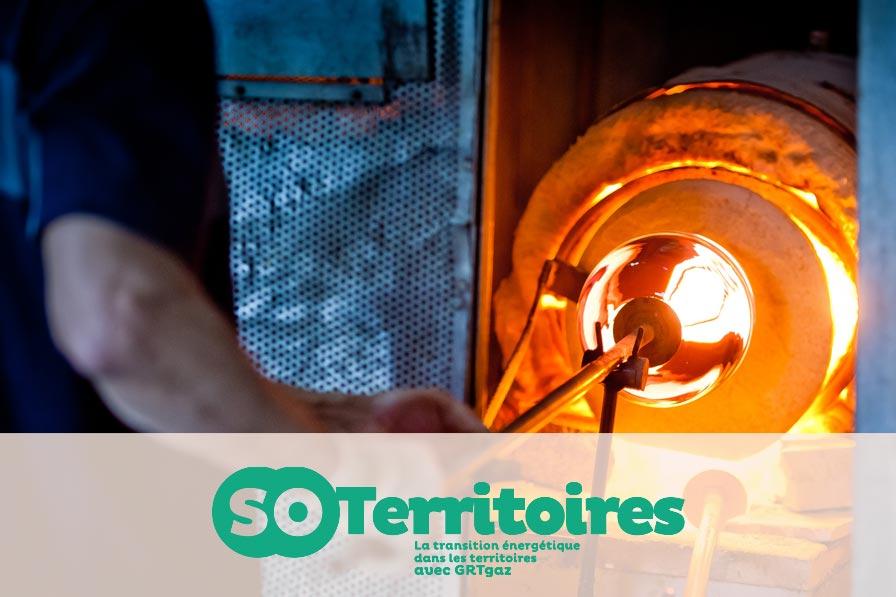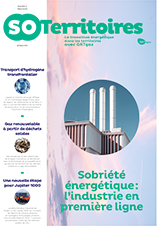Reducing energy consumption: French industry at the vanguard

As a collective response to the current energy crisis, reducing energy consumption is a challenge facing all French industry, which produces around 20% of the country’s total CO2 emissions. But can these energy savings act as an accelerator for decarbonisation? Industrial stakeholders are taking the necessary steps alongside GRTgaz and the local authorities.
On 8 November 2022, President Emmanuel Macron gathered representatives from the 50 industrial sites that emit the most greenhouse gases (GHGs) in France. The tone is set. Industry must step up its decarbonisation efforts to meet the environmental challenge and confront the energy crisis. The goal is to reduce industrial emissions by 20 metric tonnes of CO2 equivalent (MTCO2e) by 2030. In exchange, the state will release up to €10 billion in aid, in addition to the €9 billion promised for renewable hydrogen. “We have a future if we understand how to meet three major objectives together: climate, industrialisation and energy sovereignty,” stated Emmanuel Macron. Decarbonisation is long-held ambition. In 2020, the French National Low-Carbon Strategy (SNBC) set a reduction target for industry of -35% GHG emissions by 2030 (vs 2015). In France, the sector emits approximately 90 MTCO2e per year, i.e. 20% of the country’s emissions. And this is a highly concentrated ecosystem. Fifty percent of its emissions come from three consumption basins: Dunkirk, Le Havre and Fos-sur-Mer.
“Decarbonisation is not necessarily synonymous with electrification, as not all industrial processes can be electrified. Gas networks will therefore have a role to play, particularly with renewable gases and decarbonised hydrogen.”Vincent Rousseau
GRTgaz North-East Territorial Delegate
The target: to reduce consumption by 15%
Since the war in Ukraine, decarbonising industry has taken on a fresh significance. Reducing natural gas consumption to avoid potential supply disruptions, with serious economic or social consequences, has become a collective emergency. The European Union has set a target -15% reduction in gas consumption by 31 March 2023 (vs 1 August 2022). Industrial companies are the most frequently hit by the need to consume less. “The surge in energy prices has had an obvious effect,” says Vincent Rousseau, GRTgaz Northeast Territorial Delegate. In its 2022 Gas Review, presented on 10 February, GRTgaz revealed a sharp fall in industrial gas consumption compared to 2021 (-19% in the refining and petrochemicals sector; -19% in the metallurgy sector; -11% in the chemicals sector). At the same time, the French state used existing measures to implement a staggered emergency plan (see box).
Ecogaz: mobilising to consume less
The energy savings plan announced on 6 October was also a gamechanger. On 20 October, GRTgaz launched the Ecogaz platform “to mobilise people from outside the industrial sphere. If individuals, services companies or administrations get involved in reducing energy consumption, this will help to maintain industrial activity by avoiding load shedding,” explains Vincent Rousseau. In mid-January, a hundred partners, including a dozen local authorities and as many industrial companies, media companies and energy suppliers had already signed a commitment charter.
“Local authorities play a key role in reducing energy consumption because they act on two fronts: by taking steps to reduce their own consumption, and by spreading the message to the wider population.”Vincent Rousseau
GRTgaz North-East Territorial Delegate
Generating collective emulation
The crisis also acts as a catalyst for innovation. In October, the strategic contract for the New Energy Systems sector launched the Je-decarbone.fr platform. This decarbonisation scheme seeks to encourage emulation by bringing together industrial companies and innovative solution providers. GRTgaz is a member of its Core Team*, and plays its part in bringing the network to life and stimulating innovation. Events are organised by sector or by basin, with the Regions playing a central role. “Regional councils are keen to preserve their industrial fabric and support decarbonisation – this at a time when industrial companies are increasingly focused on eco-circular solutions and seeking to increase the value of their territory," notes Vincent Rousseau. “So forging these links is a logical step. Hauts-de-France, Grand Est and Sud regions are prime examples of this.” The process thus confirms the alignment between industrialisation and decarbonisation.
* Team made up of major stakeholders, mostly from the energy sector
Publications


